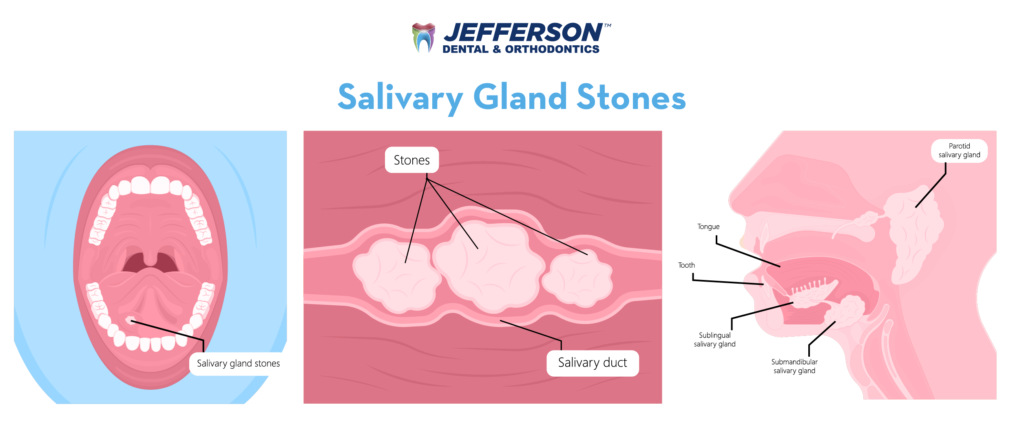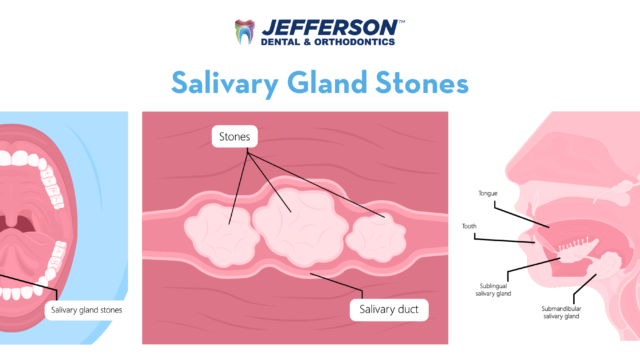If you’ve ever had a blocked gland or duct, you know it can be painful. When it happens in your mouth, the blockage affects your salivary glands.
Sialoliths, or salivary stones, are small, solids that form in glands in your mouth and prevent your saliva from flowing. It can be painful, but you can usually treat them at home, so they aren’t often something to be concerned about. Read on to learn more about salivary gland stones and how to treat them.
What is a Salivary Stone?
To begin, it helps to understand a little bit about salivary glands. Your salivary glands produce saliva which protects your teeth and aids in digestion. You have hundreds of minor glands and three pairs of larger salivary glands.
When calcium and other minerals build up to form stones, they can block saliva flow and irritate the glands. Irritated glands swell and cause discomfort until the blockage is removed.

Salivary Gland Stone Symptoms
Generally, you don’t notice salivary gland stones until they block the flow of saliva. They are usually hard and whitish in color. Common symptoms include:
- A lump under the tongue that’s sore
- Pain and swelling along the jaw and even in the ears
- Eating makes pain worse
- In cases of infection, there may be pus around the stone and usually involves a fever.
Salivary Gland Stone Causes
Unfortunately, we don’t have a complete understanding of the causes of salivary gland stones. We do know that certain factors increase your risk for developing them.
- Men get them more often than women.
- They are more common in advanced age.
- Radiation therapy to the head or neck can increase your chances.
- Any injuries to the mouth can raise your risk.
- Some medications that impair saliva production can put you at risk.
- Certain physical conditions, like Sjogren’s syndrome, gout, and kidney problems increase the chances.
- Failing to drink enough water each day can be a risk factor.
Salivary Gland Stones Diagnosis
Usually, salivary gland stones can be diagnosed by a doctor during a physical exam. However, sometimes you may need imaging studies or an ultrasound to identify the blockage.
Salivary Gland Stone Treatment
Most salivary gland stones can be handled at home. There are several options for dislodging the stones and finding relief.
Home Remedies
Since salivary gland stones don’t usually cause serious problems, treatment options vary but you may need to use more than one method.
- Suck on citrus fruits, like oranges and limes, to increase saliva production to dislodge the stone.
- Suck on ice cubes or hard candies, or chew sugar-free gum to stimulate your saliva glands.
- Drink a lot of fluids to keep your mouth hydrated and boost saliva production.
- Gently massage the area to help push the stone out. This can also alleviate pain.
- Over-the-counter medications, like ibuprofen, can help with pain and swelling.
Summary
Salivary gland stones, which are hard and whitish in color, often go unnoticed until they obstruct saliva flow. Common symptoms include a sore lump under the tongue, jaw and ear pain and swelling, worsened pain during eating, and fever in case of infection. Diagnosis can be made through a physical exam or imaging studies at your local dentists office. Most cases can be managed at home with remedies like stimulating saliva production by sucking on citrus fruits, ice cubes, or sugar-free gum, staying well-hydrated, gentle massage, and using over-the-counter pain relievers like ibuprofen.
Medical Treatment & Advances in Treatment Technology
If you can’t remove the salivary gland stones on your own, you may need a doctor’s help. Doctors can sometimes get a different angle and massage the stone out of the duct. Other times they may make a small incision to remove it.
In recent years, a new procedure, known as a sialendscopy, emerged as a less invasive method for removing salivary gland stones. The process involves small, lighted scopes to locate the stone. Then, the surgeon uses micro instruments to remove the stone. It’s done under local or light anesthesia in a same-day procedure.
There are rare circumstances where people have recurrent stones and sustain damage to the affected glands. In those cases, surgical intervention is necessary and the glands need to be removed.
When to See a Professional About Salivary Gland Stones
As you can see, salivary gland stones can usually be handled at home without much difficulty. However, if you develop signs of infection (fever, pus) or cannot dislodge the stone, contact a medical professional for assistance.
Though we don’t know the exact causes of salivary gland stones, we know risk factors. Maintaining good oral care and watching for changes in your mouth are two things you can do to help yourself. It’s also important to see your dentist regularly because your dental team could recognize the issues before you do.
If you are due for a regular check-up and professional teeth cleaning, the team at Jefferson Dental and Orthodontics is here for you. Book an appointment at the office nearest you!




